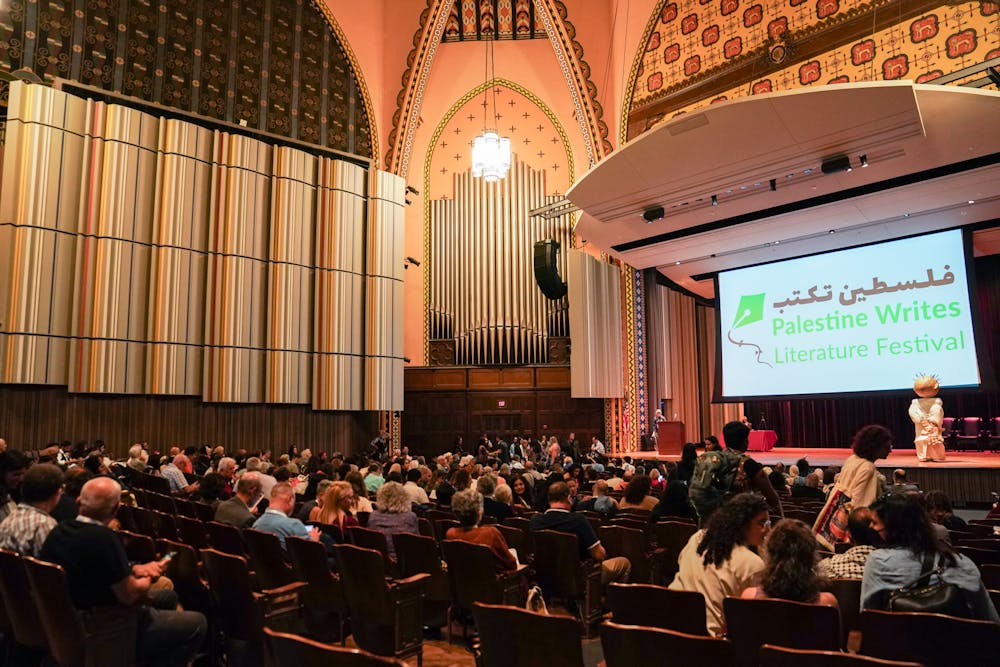
Writers and performers celebrated Palestinian art and culture while discussing their right to national independence at the Palestine Writes Literature Festival this weekend.
Irvine Auditorium was filled with demonstrations of Palestinian culture — speeches, dance numbers, and spoken word poetry — from Sept. 22 to Sept. 24. Almost all of the performers emphasized the deep ancestral roots of their culture, and called for Palestinian liberation from Israel while criticizing European legacies of settler colonialism.
Organizers said that the festival sold over 1,500 tickets and received interest from hundreds more, with their live stream of the opening night garnering over 1,000 views as of the time of publication. The participants included Penn students, faculty, and others — many of whom flew from all over the country to attend, according to Palestine Writes Executive Director Susan Abulhawa. The organization came close to hitting its fundraising goal for the event, with $81,472 raised by 793 people.
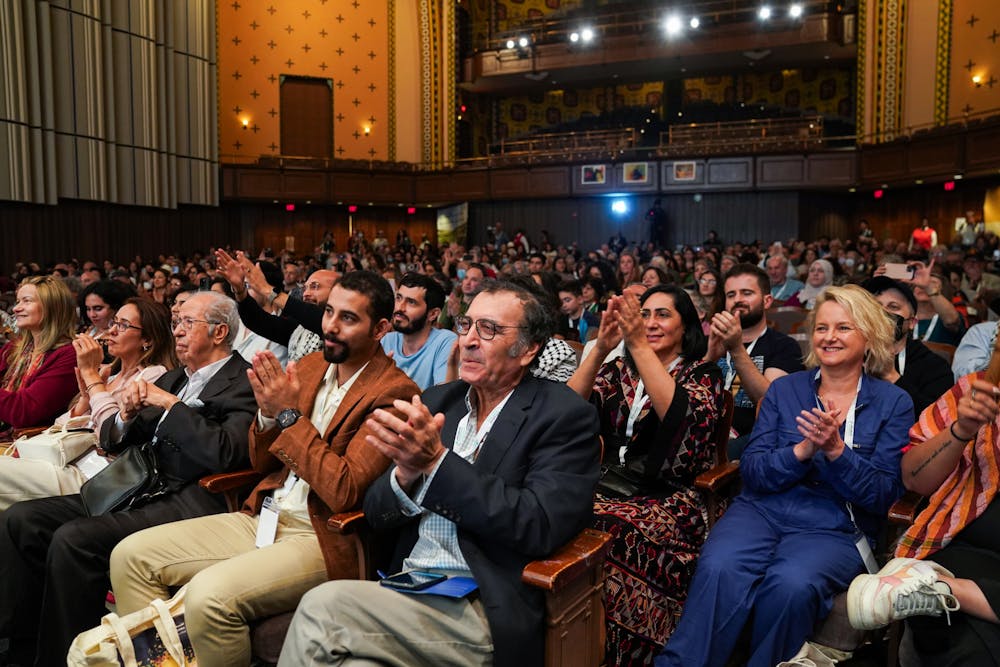
Huda Fakhreddine, a professor of Arabic literature at Penn and one of the event organizers, said that the festival goes beyond an ordinary celebration of cultural literature.
Abulhawa, a Palestinian-American writer and human rights activist, opened the festival on Friday with a video rendition of her poem, “We Never Left.”
“This is not meant to be a gathering of polite or bored society,” Abulhawa said. “It is meant to be an intersectional defiant space, where we can exist for a brief moment with agency and with our friends in our refusal to disappear, our refusal to forget or forgo our ancient past, and our refusal to accept the racist trope that pervades Western imaginations.”
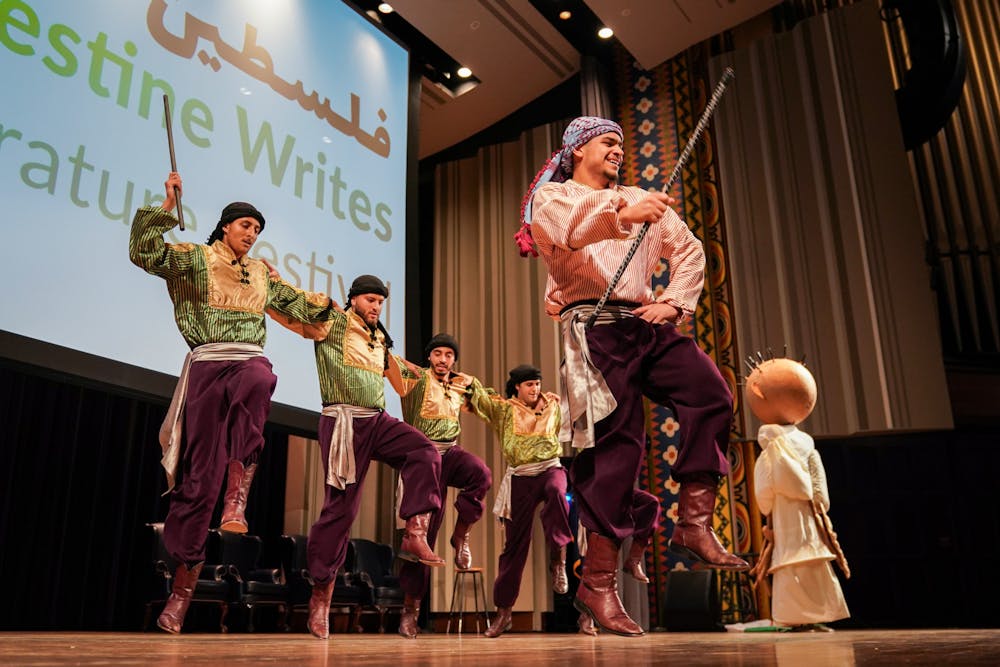
Friday’s program included a dance number by the Freedom Dabka Group and "Love Letters & Defiance" — a series of spoken word readings from Dana Dajani, a Palestinian actress and writer, and Lorna Munro, a poet and member of the Wiradjuri and Gamilaroi Aboriginal groups of Australia.
A College sophomore, who requested anonymity for personal safety, said she attended "Love Letters & Defiance" and found the performance emotional because it told the story of a person who was born on Nakba, the day that hundreds of thousands of Palestinians were forcibly displaced from their homes during the 1948 Arab-Israeli war. After reciting the poem, Dajani asked attendees to recite the names of their Palestinian ancestors who fled their homes.
“The performance itself was about the Palestinian struggle,” she said. “When I looked around the room, people were tearing up and crying."
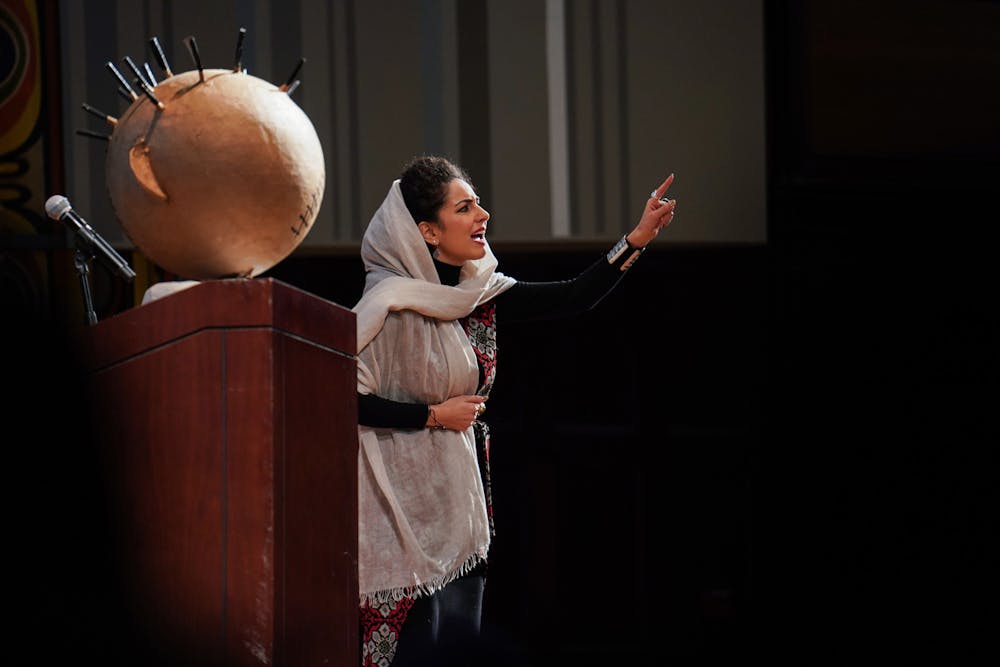
In addition to the performances, the festival included an arts and photography exhibit, kids’ arts and crafts stations, a treasure hunt, and plant-based Palestinian food.
Hilah Kohen, a Penn graduate student studying comparative literature and literary theory, learned about the festival through the Middle East Center and chose to volunteer, believing in the importance of serving as an Israeli-American and a Jewish person. They were particularly drawn to the breadth of speakers and panelists, as well as the storytelling sessions teaching Palestinian literature.
Friday's program ended with a panel titled "The Cost, Reward, & Urgency of Friendship," featuring Vietnamese-American writer Viet Thanh Nguyen, British journalist Gary Younge, and Pink Floyd co-founder Roger Waters.
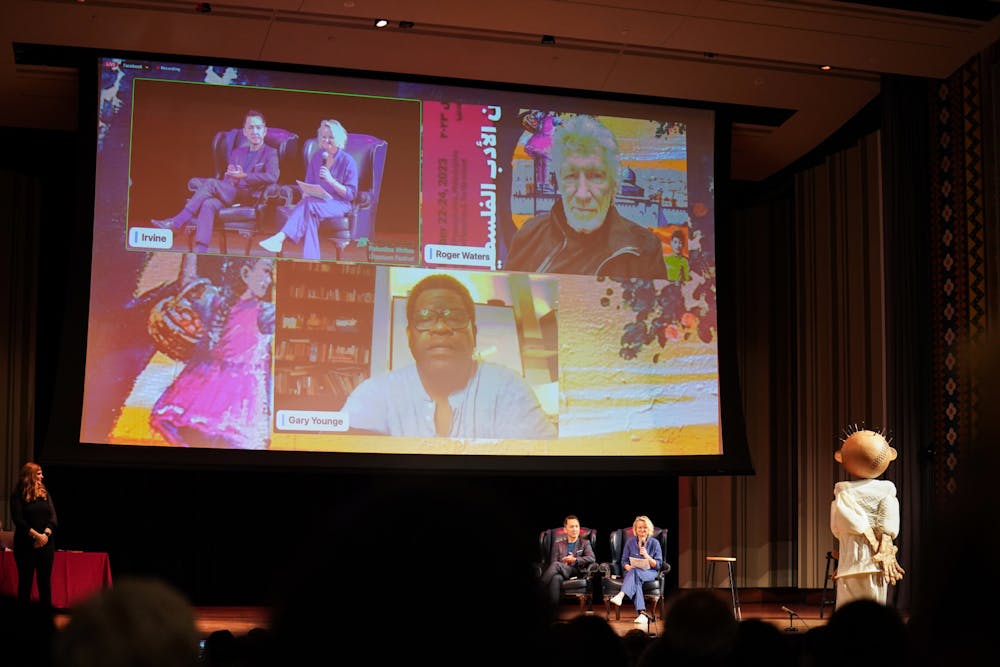
Waters joined the panel virtually from a small room in the Philadelphia International Airport, though the organizers left a chair open for him on stage — along with another empty chair for journalist Gary Younge, who said that his visa was revoked without cause on the day of his flight to Philadelphia. After flying in from the United Kingdom, Waters said that he was informed that the University would not let him attend the event in person.
In response to a request for comment, a University spokesperson told The Daily Pennsylvanian that Penn asked "both the organizers and Mr. Waters' management to honor the understanding from the beginning that he would not be appearing in person."
"Organizers of the Palestine Writes Literature Festival indicated from the beginning, and confirmed multiple times, that Mr. Waters would be participating in the event virtually," the University spokesperson wrote. "On Wednesday, September 20, less than 48 hours before the start of the event, the organizers communicated the change to in-person attendance to the University Life Space & Events team."
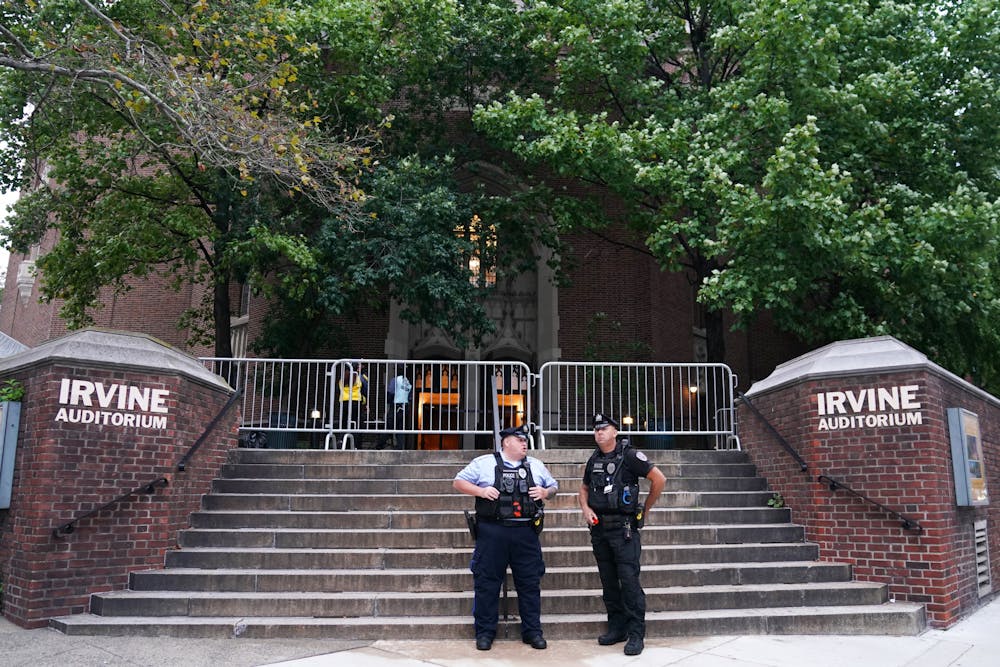
Penn provided campus safety and security resources for the Palestine Writes Literature Festival last weekend.
The spokesperson went on to write that Penn was unable to accommodate Palestine Writes organizers' request because it "would have required significant changes to event coordination, as well as additional campus safety and security resources that were unavailable on such short notice."
Waters was one of the Palestine Writes's speakers who has received local and national backlash over past comments labeled as antisemitic by some. Waters addressed these accusations during his panel, saying it is not up to the public to speculate on his beliefs.
“There is not a single modicum of antisemitism anywhere in my heart,” he said. “I hate racism in all forms, and they can believe that or not. They try to suggest that I’m an antisemite simply because I support human rights for the Palestinian people.”
Organizations outside of Penn, like the Jewish Leadership Project, had trucks circling the festival area with signs that criticized Penn’s decision to include Waters as a speaker and denounced the festival as antisemitic.
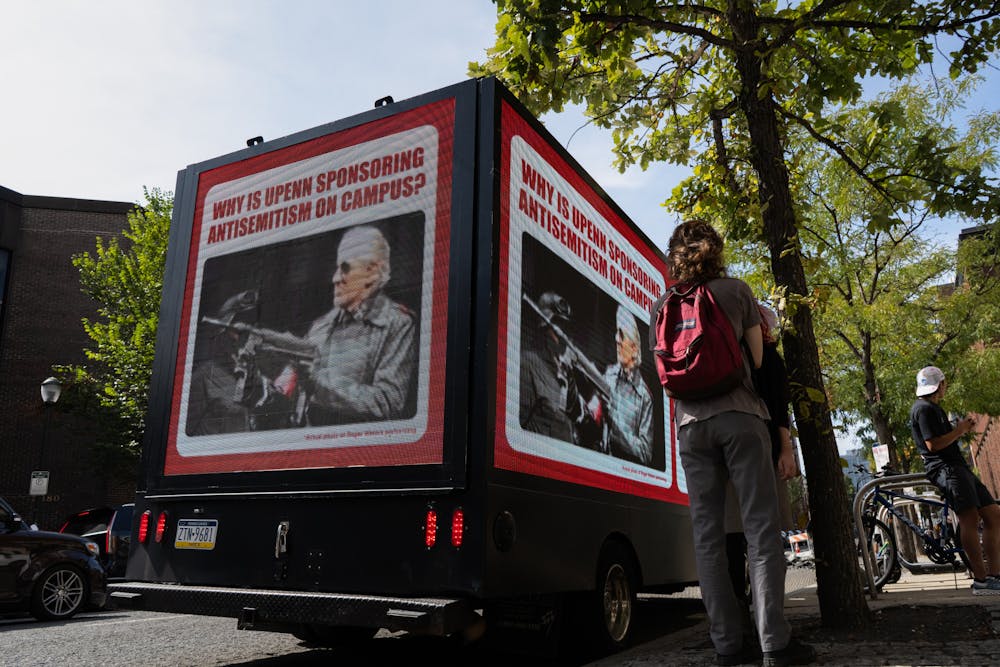
Kohen criticized these national pro-Israel organizations for attacking the festival.
“They were claiming to act on my behalf as a Jewish and Israeli-American student,” Kohen said. “That’s unconscionable to me. It was an attempt to use me as a pawn to target the wonderful environment … just because of my identity.”
On Saturday and Sunday, events included story-time readings, seminars on Palestinian culture and clothing, and various panel discussions with novelists and creatives. The festival concluded Sunday at 1:30 p.m. after three full days of activities, performances, and speakers.
Throughout the weekend, multiple speakers criticized the University for its response to the backlash surrounding Palestine Writes.
During her opening remarks, Abulhawa said that antisemitism and anti-Israel criticism cannot be considered interchangeable. She said that Jewish organizations, hoping to shut down the festival, launched a campaign in which they “paraded digital billboards around campus, photos of us in sinister colors, and quotes out of context.”
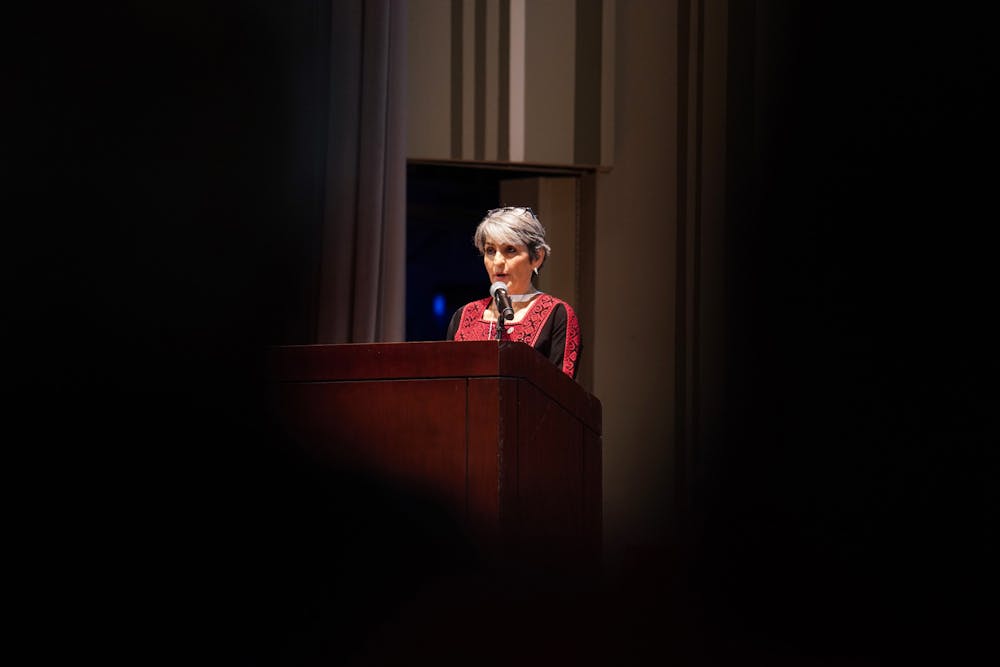
On Friday afternoon, shortly after festival performances began, Penn President Liz Magill sent an email to the University community expressing concern about the recent antisemitic vandalism at Penn Hillel and pledging support to the Jewish community. While not referring to the festival by name, Magill acknowledged that the antisemitic incidents coincided with upcoming visits to campus by "controversial speakers."
There is no evidence confirmed by the DP connecting either incident mentioned in the statement to the Palestine Writes festival.
“As always, Palestine has had to jump through unnecessary hoops, has had to fight to exist, to be named … including the cowardly [statement] that was just sent to you while we were dancing and singing,” Fakhreddine said to the audience minutes after the email was sent to Penn community members.
According to organizers, Palestine Writes received an angry email on Saturday night, criticizing the festival and calling them slurs like “towelheads” and “sand n******.”
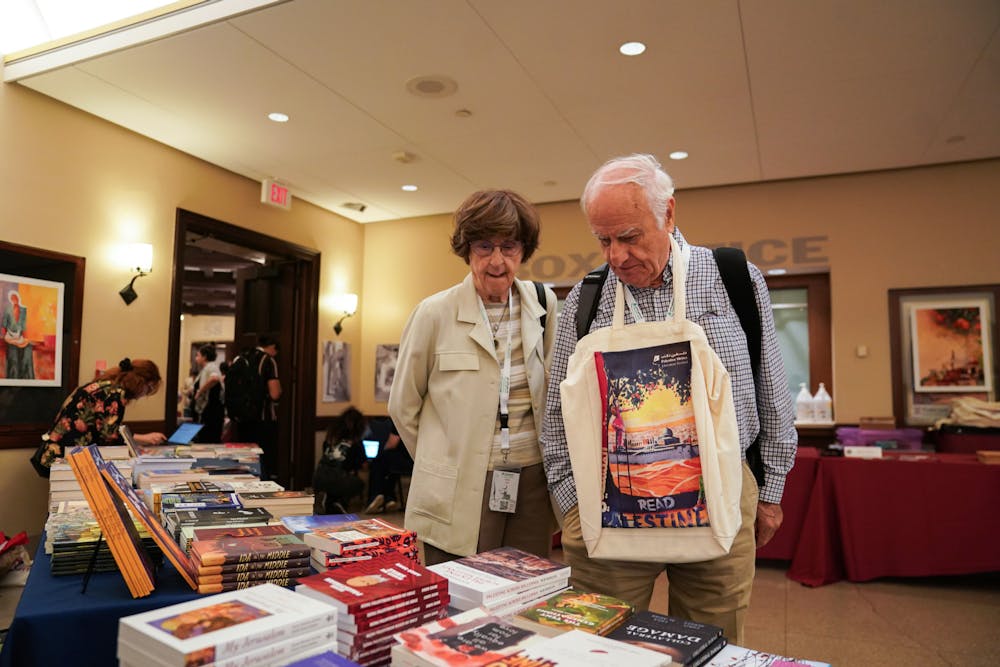
Despite this, Abulhawa said she considered the weekend a success and took pride in organizers' collective effort.
“People showed up for this festival from all over the country and all over the world,” Abulhawa said. “Our speakers showed up with brilliance, with eloquence, with impeccable scholarship, a beautiful creativity and historical accuracy, and, most of all, with dignity. And we are so inspired, so humbled.”
Editor's Note: This article has been updated to reflect that the Anti-Defamation League was not among the organizations involved with placing trucks around Penn's campus.
The Daily Pennsylvanian is an independent, student-run newspaper. Please consider making a donation to support the coverage that shapes the University. Your generosity ensures a future of strong journalism at Penn.
Donate







